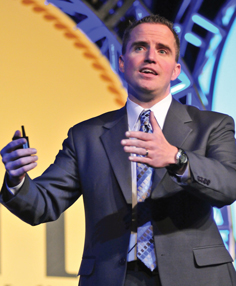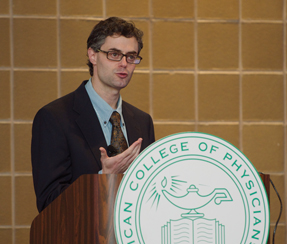Serve your trainees a feedback sandwich
The end of residency rotation isn't the only opportunity to teach. Assessing physicians should occur continuously, with a clear plan for a conversation between the attending and the trainee.
The situation hospitalist Brad Sharpe, MD, FACP, described to Hospital Medicine 2012 attendees in April may be familiar to many academic physicians. An intern announces that it's her last day on your service, and she'd like to hear your feedback on her performance ... five minutes from now.
“In those five minutes, you scramble to think of one thing you can say to that person,” said Dr. Sharpe, associate professor of medicine at University of California San Francisco. “What's the fallback? ‘Overall, I think you did a great job but, umm, uhh ... you could probably read more.’”

Since every physician can benefit from consuming more of the medical literature, Dr. Sharpe offered advice on providing more useful feedback to trainees, including how to avoid that last-minute panic.
“Put the onus on the learners, not on yourself” to plan the rotation-ending feedback, he said. This can be accomplished by telling trainees early on to provide a reminder when the end of their rotation is near, by saying something like, “I want you to approach me and we'll schedule a time.”
Start early
Early on is also the time to explain your philosophy on feedback, so as not to take a trainee by surprise the first time you criticize him. “On other rotations, that third-year medical student may not have been spoken to, let alone given feedback,” Dr. Sharpe said.
Attendings may avoid giving feedback for a number of reasons, Dr. Sharpe said, including time crunches, lack of familiarity with the trainee, fear of reprisal on teaching evaluations (e.g., “That student gave you 3 out of 5 because you told them they were unprofessional with the nurse”), and an unwillingness to be the first to criticize the young doctor. “Most of our learners have been excelling their entire lives. You may be the first person to say, ‘You're not meeting expectations,’” said Dr. Sharpe.
Perhaps because of these obstacles, surveys have found that more than 75% of trainees don't think they get enough feedback. “It's about helping them to get better. It's not a judgment of their personality or their character,” Dr. Sharpe said.
To better ensure that feedback is perceived as help, the introduction of the concept could go something like this, he suggested: “One thing you should know about me as a teacher is that I love feedback. I want you to know I'm giving you the feedback because I want you to be the best doctor you can be.”
The ‘sandwich’
Another strategy to ease the experience is the “feedback sandwich.” “You combine positive feedback, negative feedback and positive feedback. Learners may be more likely to hear both when it's combined,” said Dr. Sharpe.
Positive feedback can be easy to overlook, he noted. “Don't underestimate that it can help reinforce positive behaviors or things you want them to do.”
Some teachers like the term “negative feedback” because it gets right to the point, but for others, it is too, well, negative, in which case “constructive” is another way to describe the harder-to-swallow part of the feedback sandwich. “Frame it as ‘something you might be able to do better,’” said Dr. Sharpe.
It's also important that the “something” be very specific. The same is true of positive feedback. “Feedback is about specific behaviors, not about the interpretation of those behaviors,” said Dr. Sharpe. For a trainee, being told that he is “awkward” can be hurtful and is less useful than a critique of a specific aspect of the patient encounter, such as tone of voice or eye contact. “Think of the impact on the patient as a way to not make it a criticism of who they are,” Dr. Sharpe said.
In other examples of specific feedback, instead of praising a resident for being compassionate, it's better to say “He reached out and held the patient's hand when she started to cry.” Or instead of criticizing a resident for being unprofessional with a nurse, note the specific: “The resident raised the volume of his or her voice.”
Actually noting these instances when they happen is also key to providing effective feedback. If you can give immediate feedback to the learner, that's ideal. Of course, patient care or the presence of others may prevent that, in which case the sooner the better, so the incident or action will still be fresh in everyone's mind. “You see someone in the hallway, there's an opportunity to give feedback,” said Dr. Sharpe. “Take advantage of the opportunity to do it in the moment.”
Sit down
In addition to this on-the-fly feedback, sit-down feedback, like that requested by the departing intern, is a necessary part of academic medicine. For this, Dr. Sharpe recommends index cards and a notepad.
“This was a life-changing thing for me as an attending: Actually keep a list of the behaviors you observe.” The index cards are for taking notes on rounds—for example, that an intern's recitation of the patient history wasn't chronological. The notepad is for a running tally of all those notes, positive and negative.
By the end of the rotation, that list could be long—too long for even a sit-down feedback meeting. “At the end of a week or two weeks, pick two to four constructive or negative things,” said Dr. Sharpe. “You don't have to solve every problem that learner has.”
To begin the conversation, he recommends a self-assessment: “Ask them how they thought they did.” When asked in this open-ended way, the question can save you the trouble of bringing up their failings, or raise issues you hadn't even thought of. The downside is that learners may be too hard or too soft on themselves.
In that case, “don't get wedded to asking the open-ended question,” advised Dr. Sharpe. It can work well to make the self-assessment question more specific and leading: “How do you think you did managing rounds in the morning? Or with oral presentations? Or managing the fluids when she was in septic shock?”
After the trainee has had a chance to assess herself, it's time to give the feedback, which, again, should come as a mix of positive and negative. “There are people that believe strongly that the optimal ratio is four positive to one negative. I would just say more than one to one,” said Dr. Sharpe.
“After you've given the feedback, especially if it's hard feedback, you think, ‘Whew, I got it out there,’” he continued. But the meeting isn't over quite yet. It's only fair to offer the learner a chance to respond to the feedback. On occasion, the response may be defensive. “It's rare,” said Dr. Sharpe. “If people are resistant, say, ‘That's what I observed.’”
In most cases, that should be the end of the feedback process, unless you've noticed a serious issue that needs further attention. “Then I would encourage you to make sure to document it,” said Dr. Sharpe. “Bump it up to whoever in your program is responsible.”
Before feedback, set expectations
Every teaching physician would prefer to give positive feedback. And there's something you can do before your trainees even start work to increase the chances that they'll do a job that earns more acclaim than criticism: Set expectations.
“The expectations have to be so super, super crisp and clear,” said Jeffery Wiese, MD, FACP, professor of medicine at Tulane University in New Orleans, during a Hospital Medicine 2012 session on “Thriving as a Ward Attending.”
The process of setting expectations with a new team of trainees should begin with asking about what they hope to gain from the rotation. “They need to feel that you genuinely care,” he said.
Then, tell them about what you want, and don't be afraid to be tough and specific, advised Dr. Wiese, who described his expectations as Napoleonic. “Most residents and students already feel unsure coming onto the clinical wards. As such, they will value security more than they will value freedom,” he said. “Tell them step by step through the day what you want them to do.”
The step-by-step should cover the potential pitfalls and any tempting, but unacceptable, shortcuts. “I've been down the road you are traveling now. My guess is there will be day when you're running late getting to work, and there will be the temptation to take the short cut and just call the night float instead of meeting in person to get signout. Don't do that,” Dr. Wiese described telling his residents.
This all should be a group conversation. “You want the interns hearing what the student expectations are, because now you've empowered the interns to remind the students what the expectations are” and vice versa in some cases, Dr. Wiese said.
The learners should also be reminded to stay within the hospital hierarchy and their individual roles, he added, giving the example of a medical student who co-signed a note on his first day. “You're heading off that intern that decides they want to be the attending,” he said.
To facilitate future group communication, collect everyone's contact info and build an address book group or draft e-mail to easily contact the whole group in the future.
Finally, describing your expectations for trainees' learning will help get them off to a good start. “I don't care where you are now. I care about your delta of improvement over the month,” Dr. Wiese tells his learners, setting the stage for future feedback.




